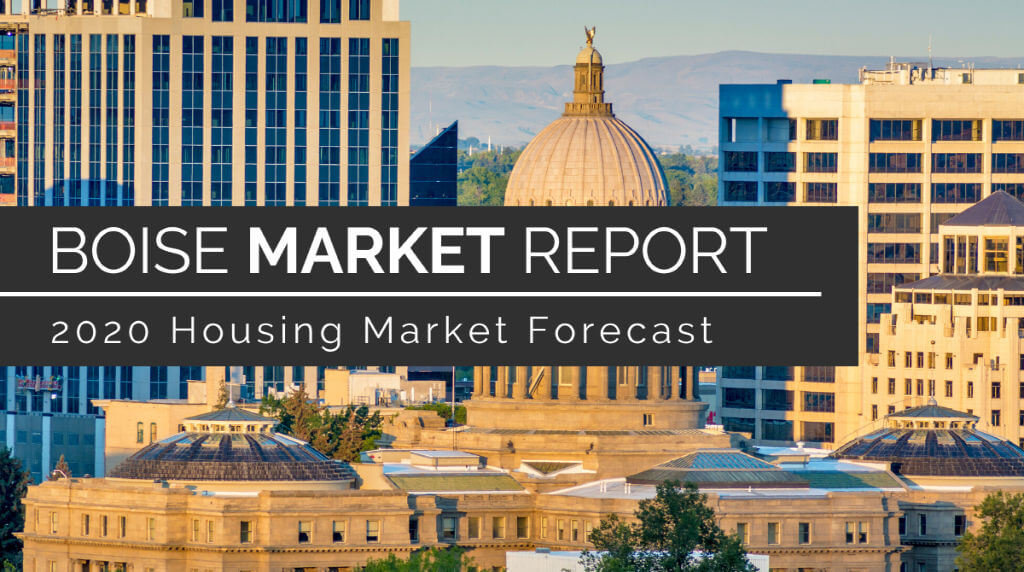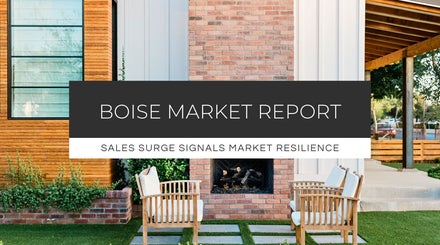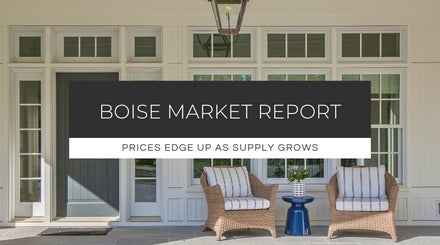
As I write this, home prices are hitting new record highs as the Boise real estate market leads the nation in appreciation.
In the past year, Boise home prices have risen 11 percent while the supply of homes for sale has declined by 10 percent.
What will the new year bring?
By definition, a forecast is an opinion about future events. Even so, I’ve made a point to focus on the facts and current trends that are already in effect, avoiding any wild speculation. Read on for an insider take on the Treasure Valley housing market in the months to come.
Boise Home Prices Will Continue Rising
Today, one in six listings are seeing multiple offers. By spring, we expect that number to jump to one in three.
Driven by low interest rates and a critical shortage of entry-level homes, prices will continue to rise, albeit at a slightly slower pace than we have seen in recent years.
There are nowhere near enough existing homes to meet demand. We are entirely dependent on new construction.
At the same time, total sales will remain constrained as affordability, and lack of supply lead to fewer choices for local buyers.
A record-low supply and the boost to affordability provided by low mortgages rates will push prices to new highs in the first half of the year.
Affordability Will Make or Break 2020
At the beginning of 2019, we saw something we hadn’t seen in the Boise real estate market in the previous four years – an increase in the number of homes for sale.
A decline in affordably brought on by higher mortgage rates and record-high home prices finally started to take the wind out of the sails of higher home prices.
And then, almost as soon as it started, the trend reversed itself as mortgage rates plummeted from 5 percent to just over 3.5 percent, increasing affordability along the way.
This trend boosted the Boise metro to the fastest appreciating housing market in the country. Hundreds, if not thousands of buyers that had been pushed out of the market by higher mortgage costs, suddenly found the dream of homeownership attainable again.
Historically, we don’t see the full effect of lower mortgage rates for 6 to 12 months. Combined with the fact that rates hit three-year lows in early September, we will be feeling the full impact right when demand jumps into high gear in March.
Where rates are headed from here is anybody’s guess. No matter how you look at it, mortgage costs are lower now than at any other time in history. If you want to time something, time mortgage rates.
Supply Will Remain Constrained (and It’s All About Supply)
Builders are building more, just not enough to meet an ever-increasing demand. Single-family home construction continues to inch upward, but population growth and demographic trends are offsetting this new supply.
The average length of homeownership continues to rise. What that means is, we are not seeing the creation of affordable inventory that we typically see when "move up" buyers sell lower-priced homes.
Also, we’re are faced with roadblocks to new supply, particularly for affordable homes that we haven’t had to deal with in the past.
A booming Boise economy and robust job market are creating a critical shortage of labor, particularly in the construction industry.
This lack of qualified employees isn’t only holding back new construction, it’s also one of the biggest threats to the local economy.
Additionally, a continued increase in anti-development sentiment will discourage builders and developers from focusing on the low margin, affordable housing that we so desperately need. It’s these affordable, typically high-density housing developments that tend to receive the most push back.
At the same time, apartments are being built by the thousands, while new condominium developments are nearly nonexistent.
In many other cities, condos make up a broad base of entry-level and affordable housing. In Seattle, for instance, condos account for nearly 50 percent of the real estate marketplace.
Locally? Out of the 3,854 new construction homes sold in Ada County in the last twelve months, only 18 were condos.
The reality in the Boise metro is this- We are building 80 percent of our housing for the top 50 percent of our highest-earning households.
A Demand Unlike Anything in History
In the coming years, local demographics alone will provide a significant boost to home prices.
Up to this point, Millennials and younger Gen Xers were predominately renting. Lately were are starting to see the shift of Millennials actually buying homes and not just rent fancy apartments near hipster cafes serving avocado toast.
A recent report from Bank of America shows 72 percent of Millennials prioritize buying a house over getting married and having kids.
Almost five million Millennials will be turning peak first time home buying age, 30, in 2020. At the same time, the oldest members of this group start turning 39, the age when people begin to look for move-up homes.
Altogether, this 71 million person generation is so large the demand they create for mortgages in 2020 will dwarf that of the Gen Xers and Baby Boomers combined.
The fact is- Millennials are buying homes, and with the lack of starter homes, they are competing for the same properties as everyone else.
A Housing Market Crash? Not So Fast
For all the market timers that are predicting a Boise housing market crash, it isn't coming 2020.
The last recession was unusual in the sense that it was a real estate recession. The "Great Recession" was started by a housing bubble that led to a real estate crash.
From the real estate market peak in 2006 to the eventual bottom, home prices dropped 17% nationwide.
Looking at past recessions, declines in home prices have been relatively minor or even nonexistent. During the recession caused by the dot-com bubble, housing values actually rose.
In the years leading up to the market crash, we saw the total number of homes for sale reach record highs. With years of lax lending, and mortgage rates approaching 6.5 percent, demand for new homes was almost nonexistent.
In contrast, today the number of homes for sale is at record lows, mortgages rates are well below 4 percent and demand is unlike anything we have ever seen.
"Over the last twelve months, the cost of the typical home in Boise rose by nearly $1,000 a week."
- We Know Boise Market Report
In the third quarter, the national unemployment rate dropped to 3.6 percent, the lowest since 1969 (that was 50 years ago folks). In October, Boise metro's unemployment rate fell to 2.3 percent.
The national economy is doing well. The Treasure Valley economy is doing even better.
Combine low mortgage rates with a healthy local economy and continued wage growth, and any downturn in the real estate market in the next few years is going to be a blink, and you missed it.
The Harsh Reality About Lower Home Prices
One thing that history has taught us about markets is, a quick run-up in prices leads to at least some form of reversion to the mean. Like pulling a rubber band between your fingers, the more you pull, the more the rubber band wants to snap back into place.
We have led the nation in home price growth for the past twelve months.
Other parts of the country that have seen a quick run-up in home prices have seen periods followed by flat or even negative appreciation.
The thing is, they never last long.
For there to be any significant and sustained price decline, the following things will need to happen:
- Further decrease in housing affordability
- Formation of new households (population growth) would need to slow considerably
- Significant increase in the inventory of homes for sale (by a factor of 3)
- Widespread belief that owning (or at least buying) a home is a bad idea
All else being equal, a small decline in home prices will create more demand, thus quickly pushing prices higher due to the increase in affordability.
That being the case, we would need to see a sustainable decline in prices that didn’t make homeownership more affordable — for instance, the effects of high mortgage rates.
While we are not as cheap as we once were, relatively speaking, we are still affordable by west coast standards. That affordability combined with the better quality of the life the Boise area has to offer continues to attract new residents by the thousands.
Eventually, we may see a decrease in inbound migration, but it’s not likely to happen any time soon.
Boise Housing Market Forecast 2020
The We Know Boise 2020 Boise housing market forecast calls for continued home price appreciation in the first half of the year. Affordability will continue to decrease as the cost of waiting grows. The supply of new homes for sale will remain near record lows, particularly in the entry-level price points. Demographic trends will push demand to new highs creating more completion for homes than ever before.







Leave A Comment